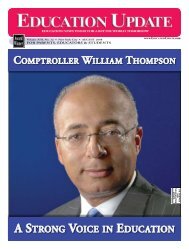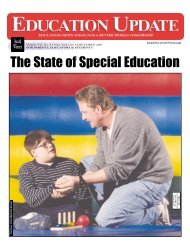Download PDF - Education Update
Download PDF - Education Update
Download PDF - Education Update
You also want an ePaper? Increase the reach of your titles
YUMPU automatically turns print PDFs into web optimized ePapers that Google loves.
14www.<strong>Education</strong><strong>Update</strong>.com | NOV/DEC 2010 WHERE IS SMcGraw-Hill HoldsFirst <strong>Education</strong> SummitTesting ObsessionShould End NowBy Judith Aquinon a nod to the rising demand forschool reform, the McGraw-HillResearch Foundation recently heldits first Innovation in <strong>Education</strong>Summit, which emphasized the need for ideas tohelp drive student achievement.Held at the McGraw-Hill headquarters in NewYork City, educators and intellectual leaders discussedways to save failing schools, the purposeof high school, the role of technology in highereducation and other issues.Approximately only 70 percent of Americanstudents receive a high school diploma, reportedthe EPE Research Center, a division ofthe non-profit organization Editorial Projectsin <strong>Education</strong>.“I’m absolutely convinced our nation is inperil because of what’s happening in our publicschools,” said keynote speaker Geoffrey Canada,president and CEO of Harlem Children’s Zone.“We can no longer accept the status quo of the last30 years. The situation today demands increasedaccountability for the success of our students.”Canada shared with the audience his experiencesas an education reformer and how his organizationused social innovation and a data-driveneducational approach to transform one of NewYork City’s most troubled neighborhood schools.Canada, whose Harlem Children’s Zone servesas a national model for educational reform, isfeatured in the documentary about the stateof the American education system, “Waitingfor Superman.”The summit consisted of a series of panel discussionsand breakout sessions focused on therole of leadership in school turnarounds and thepurpose of high school, as well as K-12 instructionand assessment, the adoption of CommonCore State Standards, and the use of teachingand learning technology in higher education.The panelists included Carol Carter, nationaland international student success author andspeaker; Christopher Cerf, a key creator ofSesame Street; Yvonne Chan, principal of theVaughn Next Century Learning Center charterschool in California and James P. Comer, professorof child psychiatry at the Yale UniversitySchool of Medicine’s Child Study Center.Also on the panel were Jordan Goldman, founderand CEO of Unigo, a Web site that allowsstudents to rate and review colleges; N. GerryHouse, president and CEO of the Institute forGeoffrey Canada, CEO,Harlem Children’s ZoneStudent Achievement, and Larry Rosenstock,CEO and founding principal of High Tech High,a network of charter schools.“Meeting student needs, providing trainingand precise teacher evaluations as well asinvolving parents and the community is whathelped us to be successful,” said Chan who converteda public school into a successful charterschool that serves 2,500 pre-school through 10thgrade students living in poverty. “Think of it asthe wheels on a car. If you take away any of thewheels, the car won’t run.”Arthur Griffin, Jr., who served as the moderatorfor the panel discussion on turning aroundunderperforming schools, noted the increasingneed for improvements to the U.S. schoolsystem. “We all recognize that the situationinvolving America’s most challenged schools isquickly approaching a crisis,” said Griffin, whois senior vice president of the Urban AdvisoryResource for McGraw-Hill <strong>Education</strong> and codirectorof the new Center for ComprehensiveSchool Improvement. “We also appreciatethe federal government’s commitment to turnaround 5,000 of the nation’s lowest performingschools within five years and to lead the worldwith the most college graduates by 2020. Thatsaid, we need to turn our attention to innovativesolutions that begin and end with strong districtwideleadership and involve clear goal-setting,a rigorous curriculum, the use of digital anddata-driven instruction and the implementationof measurable outcomes.” #The Perils andPossibilities ofTeacher Evaluationby AAron Pallas, ph.d.n the film Waiting for Superman,Harlem Children’s Zone founderGeoffrey Canada talks about hisexperiences as a beginning teacher inBoston. After completing a master’s degree atHarvard’s Graduate School of <strong>Education</strong>, Canadataught at a private alternative high school fortroubled youth. His naïve bravado—expectingthat it might take him a year or two to “straightenout” education in the U.S.—invariably draws anappreciative chuckle from the audience, as doeshis admission that he was a terrible teacher duringhis first few years of teaching.Canada is so charismatic, and obviously caresso deeply about the children in his charge, thatit seems ungracious to point out that we haveonly his word that he became a good teacher.It’s not hard to imagine that even someoneas intelligent and motivated as Canada mighthave struggled at the outset; the term “rookiemistake” is commonly used to describe thelearning curve of novices in many occupations.But what evidence do we have that he became askilled teacher?Until recently, judgments about whether ateacher is “good” or “bad” have rested on vaguecriteria and evidence. In many school districts,nearly all of the teachers who have chosen tostick it out for three years or more have beenrated satisfactory, which is the key step inachieving the due process protections of tenure.By Michael Mulgrewhe instructional strategy of the NewYork City public school system —prepping children for a now-discreditedseries of state tests — has failed.Particularly now that the state has won nearly$700 million in new federal funds in the Race tothe Top competition, we need to be honest aboutthat failure so that we can finally focus on strategiesthat will make a difference for our kids.This summer, the state Department of<strong>Education</strong>, responding to widespread suspicionthat state test standards were too low and thatthe test had become too predictable, redefined“proficiency.” The result was a dramatic plungein scores. Under the new scoring regimen, fewerthan half of the city’s 3rd- through 8th-gradersare considered proficient in reading, down fromtwo-thirds last year, and just over half are proficientin mathematics, down from 82 percentlast year.This should not have been a surprise. Whilethe city’s 8th-grade reading scores on the statetest were soaring, the National Assessment of<strong>Education</strong>al Progress, the gold standard for suchtests, showed that 8th-grade reading scores forNew York City fell from 2003 to 2007 andhave only now recovered to their 2003 level.Meanwhile, out of approximately 500 “scalescore” National Assessment points, New YorkCity’s 4th-grade math scores have gone up 11points, and two other categories have gone up 7points each. Many other big cities have done atleast as well overall, and some — particularlyAtlanta, L.A. and Boston — have done substantiallybetter.New York has to take some important lessonsfrom this debacle.First: Test prep isn’t instruction. In virtuallyevery school I have gone into in recent years,teachers complained about instructional timelost to prepping students for tests. Art and musicfell by the wayside years ago in most schools,but many schools were also shortchanging keysubjects like history and science because readingand math tests were the only ones that counted.New state tests are going to be designed to be lessvulnerable to this kind of “gaming.” To the extentpossible, test prep should be strictly limited.Second: The racial achievement gap stilllooms large. Boasts by the administration thatits strategies were closing the proficiency gapbetween white/Asian students and black/Hispanicyoungsters turned out to be baseless. Underthe new scoring regimen, the math proficiencygap between white and black students doubledSome critics wonder howthe vast majority of teacherscan be rated wholly satisfactorywhen many studentsare not meeting their state’sstandards for academic proficiency.The answer lies in ouruncertainty about how tomeasure good teaching.Clearly, it’s inadequate tojudge good teaching basedon what a principal might seeupon dropping by a classroomfor a few minutes a fewtimes a year. But how arewe to judge who is a goodteacher? Currently, there aretwo main thrusts. The first focuses on the ideathat a good teacher is one who contributes to herstudents’ learning.This idea is more challenging than it sounds,for two reasons. First, Americans expect andovernight, to 34 points from 17. Meanwhile, theadministration’s insistence on a standardizedtest for entrance into gifted programs has meantthat the percentage of minority children in suchenriched programs has declined.Third: Thousands of youngsters now inhigh school are in real danger of not graduating.The promotion gate established by theDepartment of <strong>Education</strong> for 8th-graders was sowide that almost everyone got through it. Onlystudents in the lowest achievement category(Level 1) were denied promotion, and because ofthe score inflation on the state tests, only about3 percent of 8th-graders fell into this category.The result was that thousands of children gotinto high school who were unprepared for highschool work.Fourth: Live by the scores, die by the scores.Mayor Bloomberg once said, “In God we trust.Everyone else, bring data.” The school systemvastly expanded its testing and monitoring operationsand pressured principals and teachers tofocus all attention on state tests that producedreams of data. Because the tests were so flawed,most of it is now useless.The United Federation of Teachers workedwith the state on its Race to the Top applicationbecause we believe that a rich curriculum forevery student — not test prep — is the only wayto bring real progress to our schools. Now that wehave won these new funds, the state must deliveron that promise. It must develop, based on thatcurriculum, a more reliable assessment of thesuccess of both students and teachers than anystandardized test. #Michael Mulgrew is president of the UnitedFederation of Teachers.Reprinted from The New York Daily News.demand a great deal fromour schools and teachers;and although the learningof school subjects such asreading and mathematics isa central goal, it’s not theonly one that we think isimportant. New York CitySchools Chancellor JoelKlein, commenting on hismost memorable teacher,science teacher SidneyHarris at Bryant HighSchool, once said, “Mr.Harris’s expertise was inphysics but what he taughtme went far beyond science.He pushed me. He shapedthe way I thought about my future. And he setexpectations for me that were, before then,unimaginable.” Chancellor Klein, like manyof us, valued the way in which a teacher mightcontinued on page 18
















